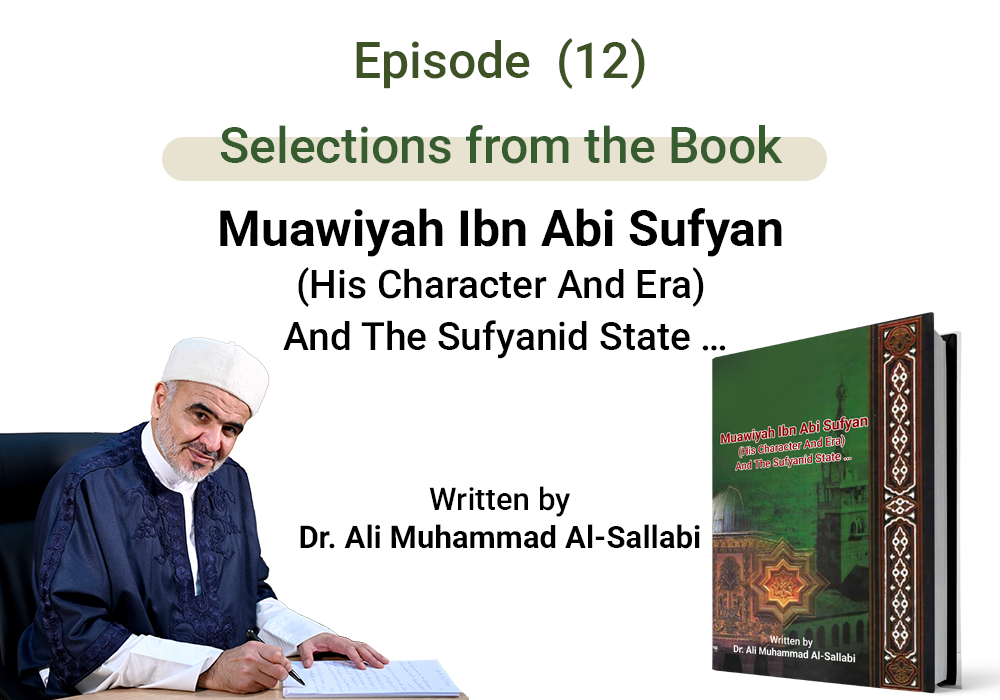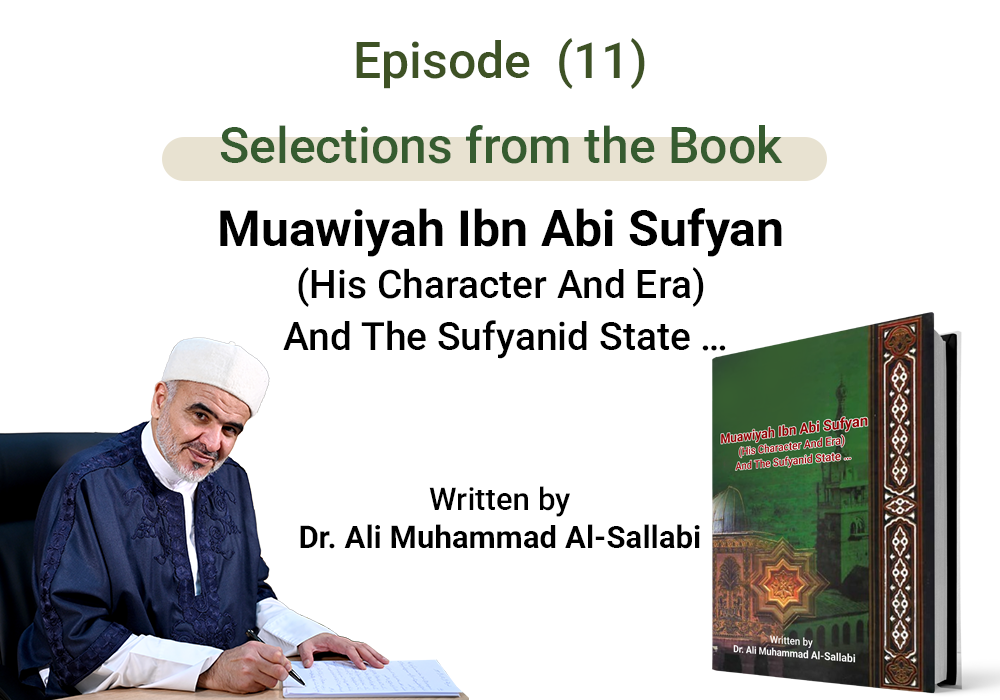Scholars’ Understanding Of The Hadith “The transgressing party will kill him”
Selections from the Book Muawiyah Ibn Abi Sufyan (His Character And Era) And The Sufyanid State …
Written by Dr. Ali Muhammad al-Sallabi...
Episode (12)
A — Ibn Hajar said: “In this hadith is a sign from the signs of prophethood and a clear virtue for Ali and Ammar, and a refutation of those who claim that Ali was not in the right in his wars”. He also said: “The hadith, ‘The transgressing party will kill Ammar’, indicates that Ali was in the right in those battles, because the followers of Muawiyah killed him.”
B — Al-Nawawi said: “The companions on the day of Siffin followed him (Ammar) wherever he went, because they knew he was with the just group based on this hadith.”
C — Ibn Kathir said: “Ali and his followers were the closer of the two groups to the truth compared to the followers of Muawiya, and the followers of Muawiyah were rebels against them, as established in Sahih Muslim in the hadith of Shu’ba, from Abu Salama, from Abu Nadra, from Abu Sa’id al-Khudri, who said: Someone better than me—meaning Abu Qatada—told me that the Messenger of Allah (peace be upon him) said to Ammar: ‘The transgressing party will kill you’”. He also said: “This was the killing of Ammar ibn Yasir, may Allah be pleased with them both, alongside the Commander of the Faithful Ali ibn Abi Talib. He was killed by the people of al-Sham, and through this, the truth of what the Messenger (peace be upon him) foretold—that the rebellious group would kill him—became clear. It also became evident that Ali was in the right and that Muawiyah was rebellious, and in this is a sign of prophethood.”
D — Al-Dhahabi said: “They were a group of believers who rebelled against Imam Ali, and that is based on the explicit statement of the Prophet (peace be upon him) to Ammar: ‘The transgressing party will kill you.’”
E — Qadi Abu Bakr ibn al-Arabi said regarding the verse: {And if two factions among the believers should fight, then make settlement between the two...} [Al-Hujurat: 9]: “This verse is the foundation regarding fighting among Muslims, and the main basis for war against those who misinterpret, and upon it the companions relied, and the notable scholars of this ummah turned to it, and it is what the Prophet (peace be upon him) meant by his saying: ‘The transgressing party will kill 'Ammar.’”
W — Ibn Taymiyyah said: “This indicates the soundness of Ali’s leadership and the obligation to obey him, and that the one who calls to obeying him is calling to Paradise, and the one who calls to fighting him is calling to the Fire — even if he is acting based on interpretation. It is evidence that fighting Ali was not permissible, and thus his opponent was in error — even if based on interpretation — or was a rebel without justification, and this is the more correct of the two opinions among our scholars. This is the ruling that those who fought Ali were mistaken, and it is the view of the jurist Imams who built upon this the rulings regarding fighting rebellious groups with misinterpretations”. He also said: “Although Ali was more entitled to the truth than those who opposed him, and although Ammar was killed by the rebellious group — as the texts state — we must believe in everything that comes from Allah and accept all of the truth, without following desire or speaking without knowledge. Rather, we follow the path of knowledge and justice, and that is the following of the Book and the Sunnah. As for those who hold on to part of the truth and neglect another part, this is the source of division and disagreement.”
Z — Abd al-Aziz ibn Baz said: “The Prophet (peace be upon him) said in the hadith of Ammar: ‘The transgressing party will kill 'Ammar’. So Muawiyah and his companions killed him at the Battle of Siffin. Muawiyah and his companions were rebels, but they were mujtahids who thought they were right in seeking retribution for Uthman’s blood.”
H — Said Hawwa said: After Ammar was killed — and the texts had made it clear that the transgressing group would kill him — it became evident to those who were hesitant that Ali was upon the truth, and that fighting alongside him was an obligation. For this reason, Ibn Umar expressed regret over his abstention, and that was only because he had left off an obligation: supporting the rightful imam against those who rose against him without right, as the jurists issued fatwas affirming this.
K — Refuting the statement of Muawiyah, may Allah be pleased with him: "He was only killed by the one who brought him": Most of the companions and followers understood from the Prophet’s (peace be upon him) statement to Ammar: “The transgressing party will kill you”, that what was meant was the army of Muawiyah, may Allah be pleased with him — even though they are excused for their ijtihad, as they intended the truth and sought it, but did not reach it. The group of Ali was closer to the truth than them, as the Prophet (peace be upon him) said. And although the imams did not approve of Muawiyah’s interpretation — as I will mention — they still excused him due to his ijtihad. Here is what Ibn Hajar says regarding the Prophet’s (peace be upon him) words: “He invites them to Paradise, and they invite him to the Fire” — if it is said: He was killed at Siffin while with Ali, and those who killed him were with Muawiyah, and he was accompanied by a group of companions — then how can it be said that they were inviting to the Fire? The answer is: They thought they were inviting to Paradise, and they were making ijtihad and are not to be blamed for following what they believed. What is meant by ‘inviting to Paradise’ is calling to the cause that leads to it — which is obedience to the Imam. And that is what Ammar was calling them to: obedience to Ali, who was the Imam whose obedience was obligatory at the time; while they were calling to the opposite — yet they are excused due to the interpretation that appeared correct to them.
Al-Qurtubi said: And Imam Abu al-Ma’ali stated in the book al-Irshad: “Ali, may Allah be pleased with him, was a rightful Imam in his leadership, and those who fought him were rebels. Having good thoughts about them requires assuming they intended good but missed it”. He also said: “Ali, may Allah be pleased with him, responded to Muawiyah’s statement by saying: Then the Messenger of Allah (peace be upon him) killed Hamza, since he was the one who sent him out”. This, from Ali, may Allah be pleased with him, is a binding argument, not one that can be answered, and it is a proof that cannot be refuted, as stated by the imam and hadith scholar Abu al-Khattab Ibn Dihya.
Ibn Kathir said: “Muawiyah’s statement, ‘He was only killed by the one who brought him to our swords’, is a very far-fetched interpretation. If that were the case, then the commander of the army would be considered the killer of those who die in the path of Allah, since he is the one who brought them to the enemy’s swords.”
Ibn Taymiyya said: “I do not know of anyone among the followers of the four Imams or others from The People of the Sunnah who holds this view. Rather, it is the opinion of many of the Marwaniyyas and those who agreed with them.”
Ibn al-Qayyim, commenting on this interpretation, said: “Indeed, the false interpretation is the interpretation of the people of al-Sham regarding the Prophet’s (peace be upon him) statement to Ammar: ‘The transgressing party will kill you’. They said: ‘We did not kill him; he was killed by the one who brought him and placed him among our spears’. This is a false interpretation that contradicts the clear wording and its apparent meaning. The one who killed him is the one who directly carried out the killing, not the one who sought his help.”
- Ali Muhammad al-Sallabi, Muawiyah Ibn Abi Sufyan (His Character And Era) And The Sufyanid State, pp. 248-253.
- Thunderbolts Sent (1/184, 185).
- Sunnah curriculum (4/406).
- The Beginning and the End (6/221).
- Fath Al-Bari (1/645).
- Al-Tazkira (2/222).
- The basis of the Sunnah (4/1710).
- Fatwas and various articles (6/87).
- Collection of Fatwas (4/437).
- Refinement of names and languages (2/38).
For further information and review of the sources for the article, see:
The Book of “Muawiyah Ibn Abi Sufyan (His Character And Era) And The Sufyanid State” on the official website of Sheikh Dr. Ali Muhammad al-Sallabi:






